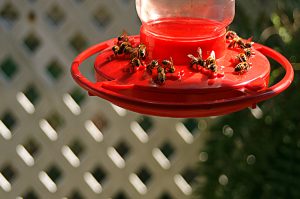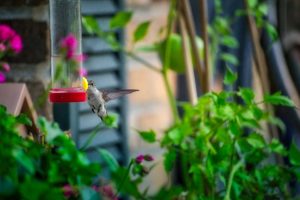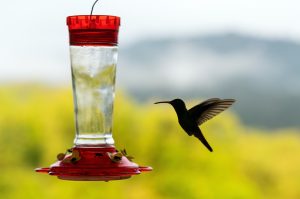PROMOTING HEALTHY, THRIVING GARDENS
Attracting pollinators to your garden this year is as simple as hanging a hummingbird feeder near your garden with a mixture of sugar water and Honey B Healthy® Original. Don’t be surprised to see bees, birds, and butterflies dining together at the feeder – pollinators coexist peacefully. Check out our printer-friendly feeding instructions for mixing ratios.
The Pollination Process

Pollination occurs when bees, birds, butterflies, other animals, water, and wind carry pollen from flower to flower.
Plants attract pollinators through visual cues, scent, food, and mimicry.
Pollinators are attracted to and visit flowers, searching for nectar and pollen. They collect pollen and visit another flower, depositing pollen on each plant they visit. This is known as cross-pollination.
The plant then uses pollen to produce seeds or fruit.
- Many plants cannot reproduce without the bees’ pollen from other plants.
- 75% of flowering plants and 35% of food crops rely on animal pollinators to reproduce.
- Roughly 1 out of every 3 bites you take is thanks to pollination.
Bring the Pollinators to Your Garden

For a thriving garden this year, use Honey B Healthy® Original to attract the essential pollinators to your plants. Since 2001, Honey-B-Healthy, Inc. has helped beekeepers maintain healthy and thriving hives. We also help gardeners and nature enthusiasts attract honeybees and hummingbirds for plant pollination and the enjoyment of watching these fascinating animals visit their feeders.
We now have feeding instructions for garden use on our FEEDING – INSTRUCTIONS page.
Additional advice for attracting pollinators to your garden:
- Provide a variety of flower colors and shapes to attract different pollinators.
- Choose plants that flower at different times of the year to provide nectar and pollen sources throughout the growing season.
- Avoid the use of pesticides! Practice Integrated Pest Management to reduce plant damage and protect pollinators by using fewer chemicals.
Want to know more about the importance of pollination?

The U.S. Dept. of Agriculture (USDA) explains the importance of pollinators here: https://www.usda.gov/peoples-garden/pollinators
The USDA’s Natural Resources Conservation Service (NRCS) has conservation recommendations by State: https://www.nrcs.usda.gov/conservation-basics/conservation-by-state
The USDA’s NRCS also has information specific to pollinator support and conservation: https://www.nrcs.usda.gov/conservation-basics/conservation-by-state/pennsylvania/the-importance-of-pollinators
The USDA’s partners at the Xerces Society have free Fact Sheets about a variety of pollinator opportunities and concerns: https://www.xerces.org/publications/fact-sheets